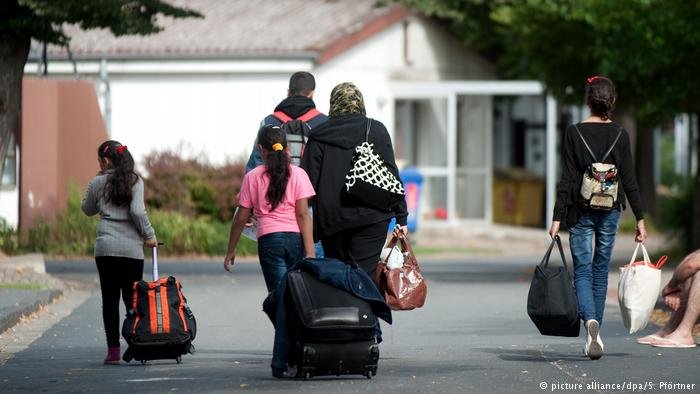The German Parliament has approved a temporary suspension of family reunification for refugees with subsidiary protection. The German Institute for Human Rights warned that the regulation would primarily affect those who have already been separated from their family members for several years, extending the separation by at least two more years.
Germany's upper house of Parliament (Bundesrat) on Friday, July 11, approved the suspension of family reunification for certain refugees for two years. The move was confirmed on the government website.
Under this regulation, refugees with subsidiary protection will no longer be able to bring their family members to Germany for the next two years. Exceptions would be allowed only in hardship cases.
Syrian refugees are seen to be the most affected by the suspension. Following the exodus from war-torn Syria in 2015, Germany took in more than 800,000 Syrian nationals. Most received restricted protection status.
People from countries such as Afghanistan, Eritrea, Somalia and Yemen are also reportedly among those who will be affected.
Limited protection status recognizes that while there may be no individual persecution, return to the home country is not possible due to war, threat of torture or inhuman treatment.
In a statement released when parliament was still debating the draft legislation, the German Institute for Human Rights already warned that if passed, the law would primarily affect those who have already been separated from their family members for several years and whose separation would be extended by at least two more years.
Read AlsoGermany moves to suspend refugees' family reunification
Not a solution
This is not the first time that the German government has suspended family reunification for individuals granted subsidiary protection. Germany also put the family reunification program on hold from March 2016 to July 2018.
In August 2018, the government imposed a monthly quota of 1,000 individuals per month and also added requirements to qualify for family reunification, such as proof of humanitarian reasons. This policy remains in place today.
The German government has justified the suspension, calling it a means to manage the country's "overloaded capacity for integration."

The German Institute for Human Rights criticized the political claim that the suspension of family reunification is a means to reduce "illegal immigration".
In a statement, Anna Suerhoff, an expert on asylum and migration at the German Institute for Human Rights, said, "Family reunification is the opposite of illegal, disorderly migration. Those who are legally allowed to join their closest relatives are not forced to come to Germany via dangerous escape routes."
The Institute added that the regulation would primarily affect people who have already been separated from their family members for several years and whose separation would be extended by at least two more years.
The Institute also said that the quota procedure or the monthly cap on the number of qualified individuals for reunification "has proven to be very time-consuming, bureaucratic, and non-transparent in practice."
Read AlsoGermany: Families separated by new policy
Emotional distress
Several studies have documented the emotional and psychological distress of separation on refugees.
A 2021 study conducted in North Rhine-Westphalia by Bielefeld University found that refugees separated from at least one child were over three times more likely to experience adverse mental health outcomes.
Among children, studies by the Charité in Berlin and the Robert Bosch Stiftung indicate that a lack of family ties and ongoing psychological stress influence the feeling of belonging and integration. Language acquisition, school attendance, as well as social participation in everyday life are affected.
Participants reported feelings of isolation, disrupted daily life, and emotional suffering due to the absence of family members, highlighting the critical role of family connections in children's well-being
'Enormous' impact on those already in Germany
For those affected by the policy implementation, the suspension of the family reunification program could result in long-term social and psychological consequences.
"Worried and afraid for their family members, people found it difficult to make the necessary effort to learn German, find a job, and adjust to life in Germany," the Institute said in a statement.
Further, the Institute highlighted how the blanket suspension of family reunification overlooks the needs of children.
"The two or more years of separation from one's own parents resulting from the suspension of family reunification is a serious intrusion."
The impact of a timeframe of two years on the development of a young person is vastly different from the impact the same timeframe might have on the life of an adult.
"For both unaccompanied minors whose family members wish to join them, and for children who have initially remained in their country of origin without their parents, waiting for several years in uncertainty about when and whether family reunification will be possible again is unreasonable," the Institute said.
